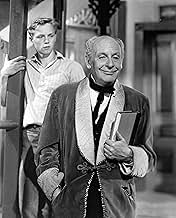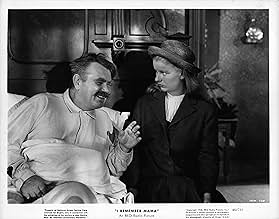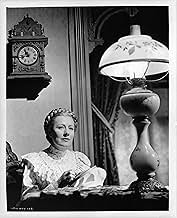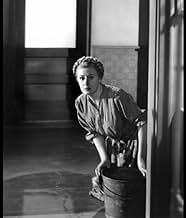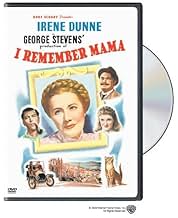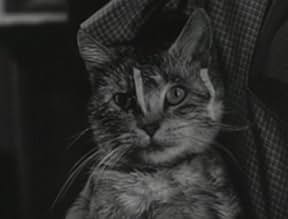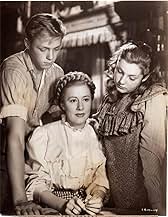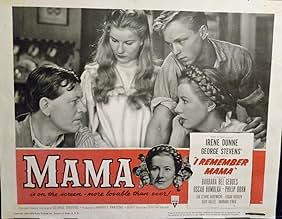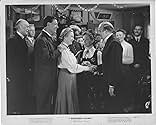CALIFICACIÓN DE IMDb
7.8/10
6.4 k
TU CALIFICACIÓN
Los altibajos de una familia de inmigrantes noruegos, alrededor de 1910.Los altibajos de una familia de inmigrantes noruegos, alrededor de 1910.Los altibajos de una familia de inmigrantes noruegos, alrededor de 1910.
- Dirección
- Guionistas
- Elenco
- Nominado a 5 premios Óscar
- 4 premios ganados y 9 nominaciones en total
Cedric Hardwicke
- Mr. Jonahan Hyde
- (as Sir Cedric Hardwicke)
Peggy McIntire
- Christine Hanson
- (as Peggy McIntyre)
Stanley Andrews
- Minister
- (sin créditos)
George Atkinson
- Postman
- (sin créditos)
- Dirección
- Guionistas
- Todo el elenco y el equipo
- Producción, taquilla y más en IMDbPro
Opiniones destacadas
Funny, warm movie about Norwegian family in San Francisco before WW I. How Irene Dunne lost the Oscar to Jane Wyman (Johnny Belinda) is a mystery. Dunne is so totally wonderful in this film--and what a film. Beautifully directed by George Stevens, he captures all the humor and life of this family. Stevens also uses techniques like fore- and background action--there's always several things going on in every scene. He also uses overlapping dialog 20 years before Robert Altman made it fashionable. And what a perfect cast. Irene Dunne (maybe her best performance ever) stars with Barbara Bel Geddes, Oscar Homolka, and Ellen Corby (heartbreaking yet funny as Trina)--all Oscar nominated. Then there is Philip Dorn, Edgar Bergen, Rudy Vallee, Hope Landin, Edith Evanson, Barbara O'Neil, Florence Bates, Cedric Hardwicke, and Steve Brown. The novel by Kathryn Forbes spawned this movie, a play, a TV series, and finally a Broadway musical. At one point Greta Garbo was considered as Mama, and even Marlene Dietrich sought the role. Thank goodness they gave it to Irene Dunne! The aunts as played by Corby, Landin, and Evanson are wonderful. And oh BTW, Homolka lost to Walter Huston for The Treasure of the Sierra Madre, while Corby and Bel Geddes lost to Claire Trevor for Key Largo.
It was a funny old post-war industry. I Remember Mama came out of RKO when that studio was in its darkest phase, and most of its output was creepy little horrors and thrillers, under the guidance of Dore Schary, who a few years after this would add a streak of gritty realism to MGM's dream world. And although this was one of RKO's comparatively small number of A-pictures released around this time, much of its crew were veterans of the B-unit – writer DeWitt Bodeen, cinematographer Nicholas Musuraca and composer Roy Webb had all worked on Cat People amongst other Val Lewton horrors. And director George Stevens, even though his pre-war output was mostly romantic comedies, was emotionally troubled by his wartime experiences and his work subsequently took an a far more sombre tone. But in spite of all this, I Remember Mama is one of the most sweetly uplifting pictures of its era.
This is perhaps not so surprising when we look a bit more closely at the people involved here. It's true, Bodeen's scripts for the Val Lewton horrors were deeply disturbing and filled with uncomfortable psychological insights, but they were also very humane and sympathetic towards villains and victims alike – something you don't often get in the genre. They were also very carefully balanced, with a real understanding of structure. You can see that understanding in I Remember Mama, particularly in the way it uses comedy. Funny moments dovetail into sad ones and vice versa, which gives more weight to the poignant scenes and stops them becoming mawkish.
The cinematography of Musuraca once gave those RKO B-horrors their distinctive look – much of the screen shrouded in mysterious darkness, with key elements picked out in stark white. With I Remember Mama (for which he received his only Oscar nomination) he actually does something quite similar, albeit for very different effect. In interior shots he makes the backgrounds rather indistinct, while the actors are sharp and clear. This encourages us not to focus on the humbleness of the location, but on the people within it. However there are points of brightness on the home set where most of the story takes place, from windows or plates, which gives depth and character to the place when it is needed. In fact, this whole set is a lovely design – each room is very small, but there seem to be numerous doors and stairways coming off room, giving a feeling of cosiness without confinement.
At first glance, I Remember Mama is an anomaly in the post-war career of director George Stevens. With a few exceptions, all his pictures before he did war service in Europe were comedies, and all his pictures after the war are not except this one. However, while there is a lot of humour in I Remember Mama, and Stevens no doubt realised the importance of it, it all comes from Bodeen's screenplay (and John van Druten's stage play). It is not the style of rigorously timed physical comedy that Stevens used to personally build into his pictures, such as the breakfast routine in Woman of the Year.
But there are other ways in which Stevens has changed. He has become a little more subtle and relaxed. His earlier pictures contain a lot of camera movement and very intense close-ups. Now he often calmly keeps the camera back, showing the characters moving around their environment. He is very much concerned with movement within the frame, such as a swinging pendulum that gives a soothing quality to the image. Perhaps the best example is in the hospital when Irene Dunne visits Dagmar in the night. Rather than closing in and making the moment just about mother and daughter, Stevens expresses it through the entire room, with a billowing curtain in one corner keeping a tiny bit of movement going, and here and there children sitting up to listen, really capturing the tenderness and intimacy.
Of course much of the charm of this picture comes not from how it is written or shot, but from who is in it. At the centre of things is a typically understanding and believable performance from Irene Dunne, perhaps the greatest actress never to win an Academy Award. She is supported by steady turns from Philip Dorn and Barbara Bel Geddes. However, the most truly excellent contributions are those of Edgar Bergen, Ellen Corby and, of course, Oskar Homolka. It is the impeccable timing and rapport between these three that make that all-important comedy element work.
I have mostly looked at this picture from the point of its being at odds to the careers of its creators, and some might say this is missing the point. After all, it simply goes to show that truly creative people are versatile. Still, it fascinates me that all that darkness and pessimism of RKO in the 1940s could still give us something as stirring and beautiful as I Remember Mama.
This is perhaps not so surprising when we look a bit more closely at the people involved here. It's true, Bodeen's scripts for the Val Lewton horrors were deeply disturbing and filled with uncomfortable psychological insights, but they were also very humane and sympathetic towards villains and victims alike – something you don't often get in the genre. They were also very carefully balanced, with a real understanding of structure. You can see that understanding in I Remember Mama, particularly in the way it uses comedy. Funny moments dovetail into sad ones and vice versa, which gives more weight to the poignant scenes and stops them becoming mawkish.
The cinematography of Musuraca once gave those RKO B-horrors their distinctive look – much of the screen shrouded in mysterious darkness, with key elements picked out in stark white. With I Remember Mama (for which he received his only Oscar nomination) he actually does something quite similar, albeit for very different effect. In interior shots he makes the backgrounds rather indistinct, while the actors are sharp and clear. This encourages us not to focus on the humbleness of the location, but on the people within it. However there are points of brightness on the home set where most of the story takes place, from windows or plates, which gives depth and character to the place when it is needed. In fact, this whole set is a lovely design – each room is very small, but there seem to be numerous doors and stairways coming off room, giving a feeling of cosiness without confinement.
At first glance, I Remember Mama is an anomaly in the post-war career of director George Stevens. With a few exceptions, all his pictures before he did war service in Europe were comedies, and all his pictures after the war are not except this one. However, while there is a lot of humour in I Remember Mama, and Stevens no doubt realised the importance of it, it all comes from Bodeen's screenplay (and John van Druten's stage play). It is not the style of rigorously timed physical comedy that Stevens used to personally build into his pictures, such as the breakfast routine in Woman of the Year.
But there are other ways in which Stevens has changed. He has become a little more subtle and relaxed. His earlier pictures contain a lot of camera movement and very intense close-ups. Now he often calmly keeps the camera back, showing the characters moving around their environment. He is very much concerned with movement within the frame, such as a swinging pendulum that gives a soothing quality to the image. Perhaps the best example is in the hospital when Irene Dunne visits Dagmar in the night. Rather than closing in and making the moment just about mother and daughter, Stevens expresses it through the entire room, with a billowing curtain in one corner keeping a tiny bit of movement going, and here and there children sitting up to listen, really capturing the tenderness and intimacy.
Of course much of the charm of this picture comes not from how it is written or shot, but from who is in it. At the centre of things is a typically understanding and believable performance from Irene Dunne, perhaps the greatest actress never to win an Academy Award. She is supported by steady turns from Philip Dorn and Barbara Bel Geddes. However, the most truly excellent contributions are those of Edgar Bergen, Ellen Corby and, of course, Oskar Homolka. It is the impeccable timing and rapport between these three that make that all-important comedy element work.
I have mostly looked at this picture from the point of its being at odds to the careers of its creators, and some might say this is missing the point. After all, it simply goes to show that truly creative people are versatile. Still, it fascinates me that all that darkness and pessimism of RKO in the 1940s could still give us something as stirring and beautiful as I Remember Mama.
This film is absolutely one of the most heart-warming and wholesome classics of all time. Irene Dunne ("Mama") is STUNNING as is her comically gruff character opposite ("Uncle Chris")portrayed brilliantly by Oscar Homolka. Both of their performances here were nominated for Academy awards in 1945.To boot, this film had one of the most amazing directors ever George Stevens(the director of PENNY SERENADE-also in desperate need of a higher quality DVD release-, Talk of The Town, Shane & Giant just to name a few) The story of I REMEMBER MAMA is rich, dramatic, and yet manages to be highly comical at moments-has the same feel-good qualities that other 40's films like "It's A Wonderful Life" brought to the screen in only a manner that the 1940's has been capable of creating since then. I can not understand why this has not yet been released on DVD along with two other equally amazing/classic pictures from the mid-1940s, Kazan's "A TREE GROWS IN BROOKLYN" (1945) & The PITCURE OF DORIAN GRAY from the same year. PLEASE RELEASE, I REMEMBER MAMA, A TREE GROWS IN BROOKLYN, THE PITCURE OF DORIAN GRAY and a higher quality DVD restoration of PENNY SERENADE!!! Thank you.
It's so wonderful to read all the positive tributes to this film here, with only one dissenting voice. Sadly, IMDB chose that comment as the lead to open the comment page. I'm 53, a tough guy from Brooklyn, N.Y., but I can tell you, everytime I see *I Remember Mama* it brings honest, genuine tears to my eyes. The story is universal, not just about a Norwegian family in turn of the 20th Century San Francisco. Anyone who has had a loving mother has got to be moved by this story, a film directed for the ages by George Stevens. And what a magnificent cast, headed by the incomparable Irene Dunne! If I hadn't had the best Mom in the world already, I would have wanted Irene Dunne. Just see and cherish this work of art.
Often amusing, often contemplative, and always enjoyable, "I Remember Mama" is about as good as any movie ever made about family life. The writing, the cast, and the characters make relatively commonplace events seem significant and interesting, the episodic style works very well, and the story-telling is well done. Without anything that seems forced or unnatural, the movie covers just about every aspect of family life, and always has something worthwhile to say.
Irene Dunne heads up a fine cast, and she gives one of her many quality performances as "Mama". The supporting cast are all good as well, and they complement each other nicely. Oskar Homolka is especially worthy of note as Uncle Chris, the kind of character who seems to be found in so many families. The portrayals of the characters and the selection of situations in their lives are both so good that you feel very much a part of things, almost from the beginning.
Everything is nicely conceived and carefully crafted, and it is also a good example of the ideal way to adapt written material for the screen. Without adhering strictly to the original, it captures the feel and the themes of the original stories, showing with talking pictures what Kathryn Forbes had said so well with words.
Both the material itself and the style of the adaptation are delightful, and this is the kind of movie that takes much more skill to produce than may seem to be the case. While this kind of thoughtful, deliberately-paced film has unfortunately gone out of style at the present time, "I Remember Mama" is enduring, enjoyable, and worthwhile.
Irene Dunne heads up a fine cast, and she gives one of her many quality performances as "Mama". The supporting cast are all good as well, and they complement each other nicely. Oskar Homolka is especially worthy of note as Uncle Chris, the kind of character who seems to be found in so many families. The portrayals of the characters and the selection of situations in their lives are both so good that you feel very much a part of things, almost from the beginning.
Everything is nicely conceived and carefully crafted, and it is also a good example of the ideal way to adapt written material for the screen. Without adhering strictly to the original, it captures the feel and the themes of the original stories, showing with talking pictures what Kathryn Forbes had said so well with words.
Both the material itself and the style of the adaptation are delightful, and this is the kind of movie that takes much more skill to produce than may seem to be the case. While this kind of thoughtful, deliberately-paced film has unfortunately gone out of style at the present time, "I Remember Mama" is enduring, enjoyable, and worthwhile.
¿Sabías que…?
- TriviaIrene Dunne worked with dialect coach Judith Sater for two months to perfect her Norwegian accent. Dunne became so immersed in getting her character's voice down that she used the accent around her home with her family.
- ErroresIn the shots of the uncle's trip to San Francisco, as the ferry is pulling into the dock, the Oakland Bay Bridge is seen in the background. This bridge was not built until 1933, yet this movie is set circa 1910.
- Citas
Katrin Hanson: [reading the novel that she's just finished] "For long as I could remember, the house on the Larkin Street Hill had been home. Papa and Mama had both born in Norway but they came to San Francisco because Mama's sisters were here, all of us were born here. Nels, the oldest and the only boy, my sister Christine and the littlest sister Dagmar but first and foremost I remember Mama".
- ConexionesEdited into The Waltons: The Awakening (1974)
Selecciones populares
Inicia sesión para calificar y agrega a la lista de videos para obtener recomendaciones personalizadas
- How long is I Remember Mama?Con tecnología de Alexa
Detalles
Taquilla
- Presupuesto
- USD 3,068,000 (estimado)
- Tiempo de ejecución2 horas 14 minutos
- Color
- Relación de aspecto
- 1.37 : 1
Contribuir a esta página
Sugiere una edición o agrega el contenido que falta

Principales brechas de datos
By what name was Recuerdos de mi madre (1948) officially released in India in English?
Responda

